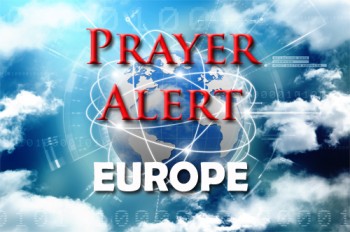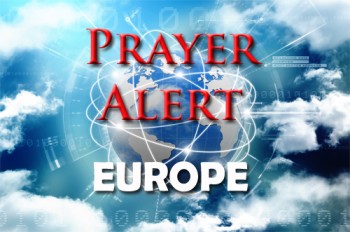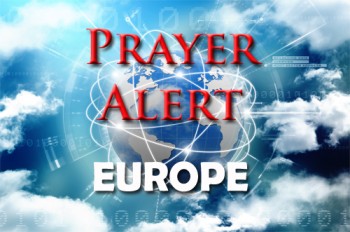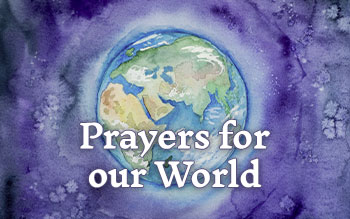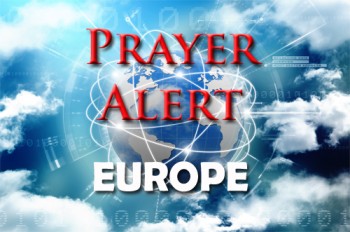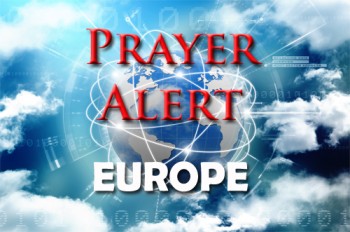Displaying items by tag: Germany
Germany / Belgium: cocaine 'worth billions' seized
Customs authorities in Germany and Belgium have seized a record amount of cocaine - over 23 tonnes - destined for the Netherlands. German officials said the cocaine had a street value of billions of euros. In 2019 the chairman of the Netherlands police union said, ‘We definitely have the characteristics of a narco-state. We're not Mexico. We don't have 14,400 murders. But if you look at the infrastructure, the big money earned by organised crime, the parallel economy, yes, we have a narco-state’. A 28-year-old man suspected of involvement in the cocaine trafficking was arrested on 24 February in the Netherlands. In 2020, 102 tonnes of cocaine heading for Europe was intercepted. Pray for the capture of powerful drug-trafficking gangs from Brazil and Paraguay who are running many of the smuggling operations to ports in Europe.
Germany: pragmatic Armin Laschet to succeed Merkel
The Christian Democratic Union (CDU), a centre-right party, has elected Armin Laschet, the pragmatic governor of Germany's most populous state, as its new leader - sending a signal of continuity before the 26 September election. The vote is not the final word on who will be the centre-right candidate for Chancellor, but Laschet will either run himself or will have a big say in who does. He is viewed as more in line with Merkel's pragmatic centrism, and spoke of the value of continuity and moderation. ‘We must speak clearly but not polarise. We must be able to integrate, hold society together.’ The decision ends an 11-month leadership limbo in the CDU. Angela Merkel, who has been Chancellor since 2005, is not seeking a fifth term.
Germany: 300 bodies waiting for cremation
Caskets are stacked three high in the crematorium, piled up in empty offices, and stored in hallways. Many are sealed with plastic, others labelled ‘infection risk,’ ‘urgent’, or ‘Covid’. A surge of coronavirus deaths has boosted crematorium businesses but nobody is celebrating. There are 300 bodies waiting to be cremated, and dozens more arrive every day. Schaldach, the crematorium owner, said comments on social media are saying reports of bodies piling up at his crematorium are fake news. Franziska Schlieter. who runs a food store,feels easing the lockdown over Christmas was a mistake. She said, ‘In the Bible, God sent people plagues when they didn’t behave. Sometimes I have to think of that.’ Officials hope that stricter rules, and people obeying them, will bring infection rates and the death toll down. See
Germany: car drives into pedestrians, killing five
Five people have been killed and thirteen seriously injured after a car zig zagged towards pedestrians in the city of Trier. Among those killed was a nine-month-old baby. A 51-year-old man with no fixed address is in custody being questioned about the crash. He had been living in recent days in the Land Rover that was used in the attack. Chancellor Angela Merkel’s spokesperson said the scene was ‘shocking’. Police said the driver appeared to have hit pedestrians indiscriminately as he drove through the city centre at speed. They urged members of the public to avoid spreading misinformation about the incident.
Berlin: car crashes into Merkel’s gate
A car with an anti-globalisation slogan on its side crashed into the gate of the office of German chancellor Angela Merkel in Berlin on 25 November. The driver is in custody, and Berlin police wrote on Twitter they are investigating if he hit the gate intentionally. Photographs from the scene of the incident showed a vehicle with the words ‘Stop globalisation politics’ written in white on the Volkswagen sedan’s right side and ‘You damn killers of children and old people’ scrawled on the other. The police have said they do not suspect an extremist attack. The chancellor was due to host a video call with federal state leaders on the day of the crash, during which a lockdown extension and additional restrictions to deal with the coronavirus pandemic over the holidays were expected to be discussed.
Germany: Giving thanks for 30 years of re-unification
This year is the 30th anniversary of the re-unification of Germany. Our friends at European Evangelical Alliance have invited us to share in some prayers and thanksgiving for Germany at this time.
Our recent national holiday was a time to celebrate and to thank God. After the fall of the Berlin Wall on November 9th, 1989, and the rapid political changes within one year, the accession of former East Germany (GDR) to be within the scope of the Basic Law of the Federal Republic of Germany was sealed on October 3rd, 1990.
Since then, as a reunited German nation, we have trodden a historic path, from two very different political entities and a divided nation after the Second World War into a common identity as one nation. This path has not been without pain and has required sacrifice and grace on both sides - so that it can best serve all our people and indeed other nations.
On this anniversary we want to celebrate and be thankful for our united Germany, and above all for reunited families, for the new marriages, families, friendships and relationships that have occurred since the fall of the Berlin Wall, for the new generation of children born, and for the freedom and prosperity throughout Germany.
As we thanked God for our Basic Law at the prayer conference in Bonn last year, let us now thank God for the abundant blessing that we have received.
At this time, when much is being put to the test and shaken, God again wants to show us as a nation his ways of salvation that go beyond our prayers and understanding (Psalm 50:23).
- Praise and thanks for 30 years of unity. (Psalm 98)
- We lay down before the Lord everything that we have achieved. Our land belongs to Him. (Psalm 24)
- After the political turn-around 30 years ago, we ask the Father now for Germany to turn around to Him, so that He can set us free to fulfil our calling as a nation. (John 8:36) (-KH-)
The calling of Berlin
The history of Berlin, now our capital and the seat of government in our country, goes back to the 13th century.
German history was made in Berlin in so many ways. Many cultural and political debates as well as ideological disputes have their origin here in Berlin and this is still true today. The city has had to live through many times of upheaval.
The division of Germany, with the construction of the Wall, was not experienced so directly anywhere else than in Berlin as a tangible and painful reality.
With the reunification of Germany, God has opened a new chapter and Berlin has become the “city of unity” and a symbol of God's grace-outpouring and miracle-working.
The message that comes to us from Berlin is that what God has done here, He can do anywhere else in the world. Not only political but also spiritual leadership should be evident in this city, along with a servant spirit and wise understanding.
Berlin needs our love as well as God's help and guidance. The destiny and future of Berlin is important to us all. Let us pray for God's redemptive plans and together bless and set this city free in its calling.
Prayer:
- For the special protection of God in all the current winds of change and upheaval. (Psalm 27: 1)
- That God's salvation plans and purposes for Germany become visible in and for Berlin. (Isaiah 60:18)
- We speak out over Berlin: You are a city of unity, of wise leadership … – a miracle of God. (-AS-)
More at: www.waechterruf.de/international/
Let's also be in prayer for breakthrough for nations going through divisive political, cultural, economic and other turmoil at this time, including North and South Korea, Armenia and Azerbaijan, and Belarus.
Read the inspirational recounting of The Miracle of Leipzip by Jeff Fountain, which we highly recommend. (Photo used above is from that article – with thanks)
France, Germany, Spain - coronavirus second wave
President Emmanuel Macron has announced a night-time curfew in Paris and eight other cities to try to curb the rapid spread of coronavirus. It affects 22 million people and will be applied for four weeks, possibly extending to six weeks. Germany announced that bars and restaurants in higher-risk areas must close by 23:00 as the country recorded the highest daily infection figure since the start of the pandemic (6,638 in 24 hours). Private gatherings are limited to ten people from two households. Meanwhile, as Spaniards prepared to travel for a long weekend national holiday, Madrid residents were told to stay home as another state of emergency to curb rising coronavirus cases was implemented. Madrid’s leader wants a partial lockdown to avoid deeper damage to businesses: see Pray for the businesses facing bankruptcies, for the millions now unemployed, and for the governments running out of resources for furloughed workers.
Encouragement from German intercessors
‘At this time of uncertainty and rebellion in many countries because of the Covid crisis and the restrictions imposed by our governments, it is good to remember that we as intercessors must seek God for discernment. The wide range of information and interpretations that we get from mainstream media or other sources can only help us to a limited extent in our intercession. First and foremost, we get discernment from the heart of God - from the tree of life, and not by seeking to eat the fruit of the tree of the knowledge of good and evil (Genesis 2:9). God's Word brings life, correction, healing and restoration, which we all need (Revelation 22:2; Psalm 36:9). Hearing God's voice at this time is more important than any other information. We encourage you to take your time - wait for God and listen. His presence changes us and He has the words we need to intercede.’
Deeper friendship between Israel and Germany
During the last two weeks in August and for the first time ever, 185 Israeli Air Force pilots went to Germany for training in joint manoeuvres with German pilots. They also joined together to remember victims of the Holocaust and the massacre of Israeli athletes at the Olympic Games in Munich in 1972. This was a very moving expression of a growing trust and deeper friendship between Israel and Germany. God uses our hearts as places of transformation in order to literally turn the world up-side-down.
Germany: far-right protesters storm parliament building
Germany’s lockdown measures and Covid-19 restrictions provoked a protest march by around 38,000 people. Hundreds of demonstrators breached a security barrier and raced up the steps outside Berlin's parliament building. They were dispersed by police with pepper spray. Some of them held the flag of former imperial Germany, which is used by the Reichsbürger far-right group. President Steinmeier said the use of Reich flags and right-wing provocations was 'an unbearable attack on the heart of our democracy’. He said people had the right to express their anger about the restrictions and to question them publicly, including demonstrations, but his sympathy ends when protesters allow themselves to be used by enemies of democracy and political agitators. Police arrested about 300 people. Pray that Nazi imperial war flags that recall the darkest period in Germany history will be prevented from ever flying again.


